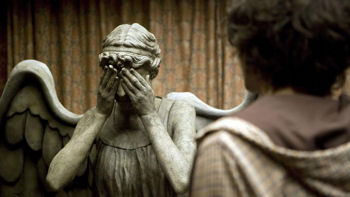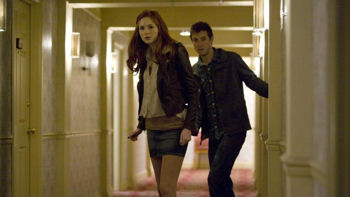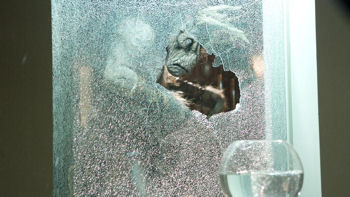I'm a sucker for a minotaur. A guy with bull horns can make even an
iffy story like "The Time Monster" just a little better, and I'm not
gonna front like the hilarious "The Horns of Nimon" isn't tied with
"The Stones of Blood" as my second favorite story of the Douglas Adams
era of Doctor Who.
So I've been looking forward to this
one since I saw the trailer for the second half of this season. A
minotaur whose labyrinth is an otherworldly hotel: sign me up.
The hotel in which the TARDIS lands (another vacation gone awry, this
one a wrong turn in space rather than time) is probably supposed to
evoke The Shining, though it also evokes The Budget. The
hotel guests are kidnapped and their rooms furnished with their worst
nightmares, essentially tenderizing them to be meat for the beast.
This being the Steven Moffat era, however, it's not so simple: the
beast doesn't feed on fear, but on the things people turn to when
they're most afraid, the forces in which they put their faith. And,
luckily, the beast is old and tired of doing this, but it can't stop
on its own. Even more luckily, the Doctor is a qualified sponsor for
Faitheaters Anonymous.
There's a lot here that feels familiar. Thanks to the running-order
switch, we had a story about people's worst fears becoming solid just
two episodes ago ("Night Terrors," remember?). We had monsters that
ostensibly echoed aspects of the Doctor himself at least twice last
season ("The Beast Below" and "Amy's Choice"). We've had treacherous
corridors and mind games ("The Doctor's Wife"). We've seen the Doctor
kneel over a monster he's essentially euthanized, who speaks to him in
a language only he understands ("Vincent and the Doctor"), and seen
him nearly euthanize another in a similar situation ("The Beast
Below").
It's thrilling to see a series that used to be derided for
its rubber monsters and thin, superficial plots work so hard to be
interior and meaningful, but when Amy jokes that their next visit will
be to a house that isn't really a house and contains "a goblin that
feeds on indecision," it's an apt criticism. We'd be dangerously close
to self-parody here if the story weren't so satisfying.
It's more satisfying if you're already of the opinion that faith
itself can be dangerous -- that one form of strong belief can too
easily be converted into another and made to serve sinister ends. I
enjoyed the moment when the Doctor says offhandedly, as if it's
something they've discussed before, that Rory has "no religious or
superstitious" beliefs and thus is of no use to the minotaur. If Rory
has "faith" in Amy, it's not the kind that means he expects her to
save him from his worst nightmares, which is arguably an admirable,
healthy, and mature perspective on love.
It's also clever that we see
different kinds of faith (in luck, in authority, in wacky conspiracy
theories) even if their potency seems a little exaggerated.
Of course, the theme we're supposed to be most interested in is the
one where the Doctor saves Amy by insisting that he can't. (This is
another moment that feels familiar, though I'm having trouble
remembering why.)
 |
It doesn't come across as a trick, though; it's not
a temporary lie to thwart the menace. He's talking to
fish-fingers-and-custard Amy as much as he is to now-Amy who's about
to worship a bull-headed creature; he's saying true things, things
I've always believed about this character that have seemed lost in
recent years. He's saying: "Look, I may have an amazing ship and two
hearts and the ability to cheat death by changing my face, and I may
have lived around a thousand years and saved the universe countless
times, but when you get right down to it, I'm just a man, an eccentric
curious clever lucky man with the best of intentions, but one who also
can make the wrong choices and fail once in a while, and that's a fine
thing to be."
After "The Girl Who Waited," some fans seemed really
upset that the Doctor didn't carry himself like a perfect golden hero.
Here's the perfect answer.
After last week, and Rory's "past tense" comment this week, and the
knowledge that the followup to the "guest companion" episode "The
Lodger" is coming up next week, it didn't come as a shock to see the
Doctor leave Amy and Rory on Earth.
It was still moving, though, and
probably the most grownup companion farewell the show's had since its
revival -- maybe ever. The Doctor doesn't leave them in a parallel
universe, or wipe their memory, or just lose them in an unlikely
rebound situation; he says goodbye to them like a proper adult
realizing he can't interrupt their lives forever.
Oh sure, he leaves
Rory a bright red sports car, and he makes goofy shy faces at Amy as
he leaves, but it just feels right in a way that this moment
so often didn't in the past. It's all but guaranteed that we'll see
them again, even if it's just to resolve the "Lake Silencio" plot in a
couple episodes, but I almost wish we wouldn't, if only to keep this
perfect.
It's hard to imagine a new companion next season, unless it's
River Song, which would annoy a lot of people -- perhaps including me,
though it would mean a return to the Romana dynamic, which wouldn't be
so bad.
Bullet points!
- This was a "bonkers prison" all right. If floating around the
galaxy picking up innocent people for this minotaur to kill and eat is
part of a just punishment, I'd hate to see the crime.
- That sound the Doctor hears when he opens his door is the
TARDIS's classic warning siren, the cloister bell. I guess we're to
assume that his own worst nightmare is of himself (perhaps in his
Dream Lord guise), given the self-loathing this Doctor is supposed to
have.
- I'd be remiss if I didn't mention the supporting actors in this
episode, who were all pretty good. I didn't enjoy the conspiracy geek
as much, but since he was "blogging" when he was abducted I guess he
was there to scare fans like me. I loved the moments where the Doctor
flirts with the medical student and "fires" Amy so he can hire a new
companion, even though those moments later come back to bite him.
- The Doctor talks to the minotaur, first through a mirror and
then through a sort of waterfall, in "The PasiphaŽ Spa." PasiphaŽ was
the minotaur's mother in the original Greek myth. These are presumably
all meant to be symbolic, but I admit I haven't worked them out
yet.
- It's a shame "Night Terrors" was moved, because it would have
nicely bookended the season to have the Doctor toss a Rubik's cube
aside in frustration the third episode in, then pick it up again and
solve it in this, the third episode from the end. It's still a cool
moment.
- Just like a fanboy, I flipped right out when the Doctor
namechecked the Nimon late in the episode. And the minotaur really
was beautiful, if you like minotaurs. And I really do.










